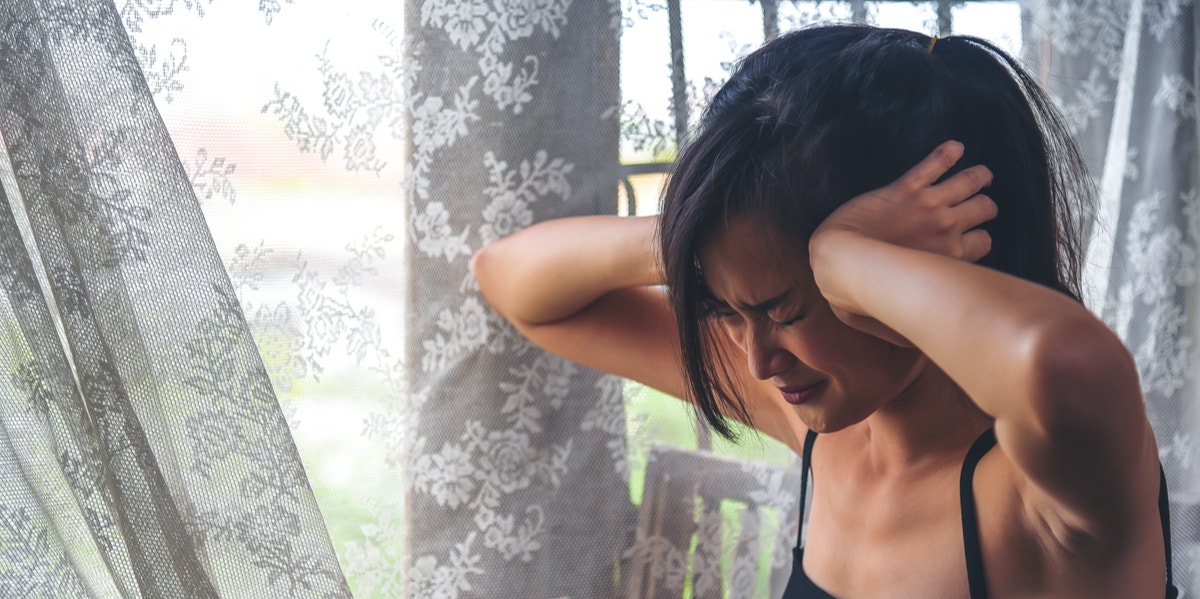What It's Like To Grow Up Bipolar — Without Ever Knowing It
It's not easy, but I'm just living (and learning) one day at a time.
 Rachaphak / Shutterstock
Rachaphak / Shutterstock I didn’t have very many friends in school, or in my neighborhood. A bully branded me with the nickname “Red Pubic Hair” (I was a ginger, and 12 years old, my pubic hair was extremely important to my classmates). After that, it all went downhill.
It was hard to make friends when they had a preconceived notion that my nether regions were sprinkled with pubes.
The only person that stuck up for me and loved me for who I was was a 13-year-old girl who lived around the corner from me, Nancy. She was my first best friend and deservingly so. She hung out with me after school, slept over at my house, and introduced me to her older friends in school.
All of a sudden, I had a squad. Over time, my grades improved and I started to win awards.
Then one day, I received the bad news that Nancy was moving out of state. We cried, and made promises to write and call each other as much as we could. I still have several letters from her, all marked with doodles and stickers, but more importantly, with love.
As usual with life, long-distance friendships don’t always remain intact as you intend them to. She and I were now in different states, different high schools, and had found new friends. We kept in touch but much more infrequently.
In my junior year, I was sleeping in my room like any normal day. It was about 5:30 in the morning and my father had woken me up, which was unusual because I still had an hour of sleep to go.
It was then he told me Nancy had been murdered and found in the woods by her home. The rest is a blur.
I remember going into hysterics, missing school that day, and having the rest of the year happen around me while I remained in a fog. It was my first bout with depression — real depression. I was 16 years old and had never dealt with such a tragedy before. I didn’t know how to cope.
My parents brought me to a therapist. Dr. Quack had the thickest accent I had ever heard at that point in my life, I couldn’t understand a word she said. However, I did manage to hear one question, “Do you masturbate?” Dr. Quack and I parted ways once I told my parents what she asked.
The depression never really subsided, I just learned how to push it aside to function.
But little did I know, I would soon be diagnosed and living with bipolar disorder.
After graduating high school, I was told I must attend college, which I did, briefly. I suffered my first panic attack during a calculus class and ran out without explanation. I found it harder and harder to sit through a class without feeling like my airways were constricted and that I might die. So, I quit.
I was lucky enough to get a job rather quickly — having a good friend in the insurance business, I was offered a position right away. Within a few months, I began to feel hyper. I couldn’t sit at my desk and work, my legs needed to move, and I had to talk to someone, anyone.
I remember being escorted back to my work desk by my manager and wondering what the heck was wrong with me. It was beyond caffeine jitters and beyond anything I ever felt. After I left that job, I was never able to stay at one job for too long.
In 2006, I met my husband, and we immediately clicked. It was one of those things where I looked at him and knew we would be married. I became a little clingy, raged out at the littlest of things, and then would fall into a deep, dark depression.
My husband knew something was wrong. I had basically alienated all our friends and family. I guess I also knew something was wrong but wasn’t ready to embark on that journey of mental illness. Not yet.
Finally, in 2013, I had to do something. I was suicidal every day and came up with different plans on how to do the deed without being messy about it. When you start actually making arrangements about your own death, that’s when you know it’s time to see a doctor.
It was a relief to put a name to what I was feeling: Bipolar Disorder. "What is bipolar disorder, anyway?" I thought. However, I had once again found myself in a really bad doctor’s office. She said, and I quote, “Wow, you have a lot of issues!” and rolled her eyes at me before handing me 6 paper scripts for high doses of medication.
I found a doctor, eventually, who was kind enough to put me on low doses of medication so that I didn’t spazz out and have constant heart palpitations. It’s been three years, and though I’ve come a long way, my life is far from normal.
I’ve put my family in debt because of my frequent manic spending periods. And there are days I can’t leave my bed because it physically hurts.
There is this taboo surrounding bipolar disorder. It can be a debilitating disorder — I’ve found that out the hard way. I’ve been on medication now for a few years and I’m mostly stable, but I don’t ever feel like I’ll ever be cured. And that’s okay with me.
I’ve learned to embrace who I am, and love myself — not despite my bipolar disorder, but because of it.
Liza Walter is a writer who focuses on current events, lifestyle, pop culture, and true crime. You can follow her on Twitter @NerdyLiza.

